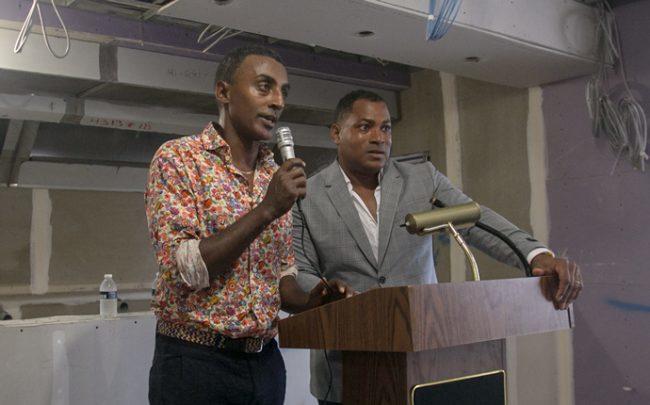On Monday afternoon, James Beard award-winning chef Marcus Samuelsson and his business partner Derek Fleming gave a sneak peak of his nearly completed Red Rooster Overtown restaurant.
Amid dangling electrical wires, unfinished air conditioning ducts and recently installed drywall panels, Samuelsson told attendees he and Fleming were careful not to open another Red Rooster in the U.S. until the Miami outpost was ready.
“We wanted to have a historical place that meant something more than just a restaurant,” Samuelsson said. “So when we got presented this opportunity four years ago, we knew it was a long road and we said, ‘let’s wait.’ [Overtown] is iconic, it is special and it is a perfect match for us.”

Marcus Samuelsson and his business partner Derek Fleming. (Credit: Korey Davis Photography)
In 2015, officials from Miami’s Southeast Overtown Park West Community Redevelopment Agency initially approached Samuelsson and Fleming about opening a supper club in the city’s historic African American neighborhood. Two years later, Marcus Samuelsson Development Group beat out six other bidders to buy a two-story, 7,600-square-foot building at 920 Northwest Second Avenue.
Samuelsson paid $1.5 million for the property, which was a former pool hall owned by famous music promoter Clyde Killens who hosted acts such as Count Basie, Duke Ellington, Sam Cooke, and Aretha Franklin. As part of the deal, the Ethiopian-born, Swedish-raised chef received a $1 million grant that must be paid back if he sells the building within the first seven years of the restaurant opening. If he sells it between seven to 10 years, Samuelsson only has to pay back half the funds. The contract also stipulates the property must be used as a restaurant for 15 years.
Since then, Fleming said he brought in Overtown real estate investor Michael Simkins as a development partner. According to Miami-Dade property records, Samuelsson’s company purchased an adjoining 2,750-square-foot vacant lot from Simkins for $450,000 in late May.
Fleming said the vacant lot will allow the Samuelsson Group to create an outdoor patio near the entrance to the restaurant. Construction began in mid-June and the entire building and outdoor area will total a little over 13,000 square feet.
“What we have been able to accomplish in a short time frame is remarkable,” he said. “This is completely adaptive reuse. Putting in a new slab, buying the other property, getting unity of title and bringing in the infrastructure to tie into this old building is no small feat.”
Miami Commissioner and CRA Chairman Keon Hardemon said Red Rooster Overtown is among several commercial projects that could make the neighborhood an entertainment destination as it was in the mid-20th century when Overtown was the only place black celebrities could stay in segregated Miami.
“You realize the changes that are coming are monumental,” Hardemon said. “This is truly the homecoming for a community that was once so vibrant that people all over the nation marveled at it.”
